Democracy
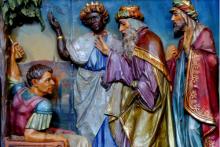
Mysterious people with political connections arrived from a country off in the East. They brought news the ruler did not like. There was a new claim to the throne. An effort was underway to remove him and install another ruler. King Herod wanted to dismiss the claims as “fake news” and a “hoax” — not because the intelligence report was inaccurate, but simply because he didn’t like the news. These Magi, after all, had done their research.

I REMEMBER THE EXACT DAY I discovered that some conservative Christians are not all that into democracy. It was 20 years ago. My daughter asked me for help with her social studies homework. I discovered that her Christian school taught a neo-Puritan civics curriculum, which proclaimed that God’s design for human government is rule by “godly Christian men” applying scripture under the sovereignty of God. I was shocked.
In the Trump era, we again witness a conservative Christian flirtation with authoritarianism. These conservative Christians compare Donald Trump to Cyrus of Persia—both authoritarian rulers, both “friendly” to but not part of God’s people, both supposedly used by God—and Trump is lauded as the president of divine providence in shlock films such as Liberty U.’s The Trump Prophecy.
Meanwhile, a quote attributed to Russian Orthodox priest and monarchist St. John of Kronstadt that “in hell there is democracy, in heaven there is a kingdom” is making the rounds on social media, occasioning much comment leaning in the direction of authoritarian rule. John of Kronstadt died in 1908 before the Russian revolution and likely associated democratic tendencies with atheism.
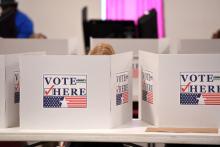
On March 8, the U.S. House of Representatives passed the “For the People Act,” a historic piece of ethics and election reform legislation that responds to some of the biggest problems our democracy has experienced in recent times. The bill itself is bold and expansive — sweeping even — in the terrain it covers, and in the marker it lays down for what democratic reform should look like.
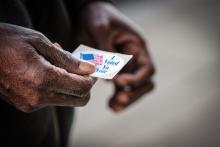
Our faith is offended by these assaults that contradict the biblical commands to love and protect our neighbors. Our conscience is seared by the lies and strategies of hateful politics that will lead to more and more violence in this country and put the soul of our nation in jeopardy. Words matter and hateful words do lead to violence. Our commitment to our brothers and sisters under attack will lead us to pray, stand, act, and vote against the politics of fear and hate, because of our faith and patriotism.
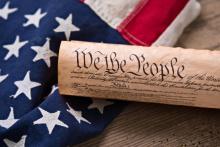
In the richest nation in the history of the world, 140 million Americans are poor or low income — one emergency away from not being able to meet their basic needs. We cannot be distracted by arguments about which president or party in recent history had more quarters with over 4 percent economic growth while Congress seriously considers cuts to programs like the Supplemental Nutrition Assistance Program (SNAP) and the Children’s Health Insurance Program (CHIP). Donald Trump is not on the ballot this November, but the fate of poor people in America certainly is. In state legislature and congressional races, we must ask ourselves which candidates are willing to challenge the lies that keep millions of our neighbors in poverty.
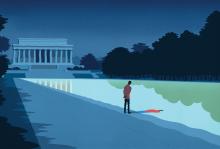
Reynolds arrived at an early morning protest in St. Paul, Minn., a few hours after Philando’s death. I heard her tell her story to a small crowd gathered on the street. Weeping, she shared how impossibly stuck they felt in the 74 seconds between stopping their car for the police and Castile being shot multiple times.
Castile was never given a chance to show identification because he was shot as he reached for his wallet. He tried to tell the officer about his legally licensed handgun, but the screaming officer didn’t seem to hear.
As Castile, Reynolds, and her young child ran errands on that summer night, civil rights laws did not protect their “life, liberty, and pursuit of happiness.” The Civil Rights Act of 1964 allowed for Castile’s employment at an elementary school and made legal their right to move through town. But these rights were not enough to protect Castile’s freedom to live.
What is democracy?
As U.S. Christians and others fight to defend the space for justice created by civil rights movements of the past, another theme rises: What does freedom mean in America today? What does Reynold’s rage require of people of faith?
At a minimum, it requires moving beyond a Sunday school version of democracy, as Southern Freedom Movement leader and historian Vincent Harding put it in 2002. “A solution of the present crisis will not take place unless ... [we] work for it. Human progress is neither automatic nor inevitable ... Every step toward the goal of justice requires sacrifice, suffering, and struggle. ... This is no time for apathy or complacency. This is a time for vigorous and positive action,” Harding said, quoting Martin Luther King’s Stride Toward Freedom.

A Deeply Moral Act
Voting is a decisive statement of Christian faith that I matter, justice matters, and others matter.
by Richard Rohr
Low voter turnout is generally a sign of a demoralized society, and people of power feed on that demoralization, knowing that they can then easily gerrymander, suppress and limit voting rights, and give elections to the rule of money and lobbyists—and there will be little outcry, because there is so little trust or even interest in the whole system anyway.
Yet this is largely where the U.S. is today.
The powers that control society are quite happy that it is always minorities of all stripes that first feel this powerlessness and this demoralization. Since the early days of representative government, it has been believed that democracy would only work if there was a truly free and informed citizenry. We presently seem to lack both in the U.S. This is why voting is a deeply moral act for me—in rebuilding confidence and encouraging an intelligent and hope-filled society. It is also a decisive act of Christian faith that I matter, society matters, justice matters, and others matter.
Not to vote is to hand our power and our dignity over to people who fear actual freedom, honest intelligence, and faith in the very goodness of humanity.
Voting for Change
I vote because many of my brothers and sisters can’t.
by Myrna Pérez
I vote for a lot of reasons. I love joining my fellow citizens in a community-minded act. I love having a say in picking the leaders who get to decide on things that matter to me. Increasingly, I love to vote and feel compelled to vote because I know there are about 4.5 million Americans living and working in communities across the country who cannot because they have a criminal conviction in their past.

The Watergate era triggered record growth in Americans’ collective dissatisfaction with government. But that record could still be broken.
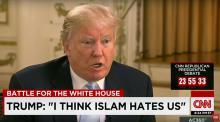
With his anti-Muslim rhetoric and planned travel bans, you’d think President Trump would be a favorite target for Islamic State’s propaganda. The jihadist caliphate in Syria and Iraq must be pulling out all the stops to slam him as the epitome of Islamophobia.
Well, think again. The extremist group that Trump vows to “totally obliterate” has hardly printed or broadcast a word about him since before the November election. The caliphate’s Ministry of Media acts almost as if he didn’t exist.
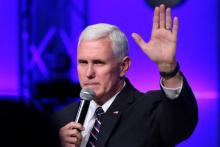
A decade ago, a critic accused me of writing a book about a “nonexistent” threat from the religious right. One reviewer called my work a “paranoid rant,” while another detractor wrote my “alarmist” views were “exaggerated and implausible.”
In The Baptizing of America: The Religious Right’s Plans For The Rest Of Us, published in 2006, I had warned that a well-financed and highly organized group of religious and political leaders was seeking to impose their narrow extremist beliefs and harsh public policies on the United States, even as our nation’s population was increasingly multireligious, multiethnic, and multiracial.

Tunisia’s Ennahda movement, the most successful Islamist party to emerge from the Arab Spring revolts early in this decade, has renounced political Islam and declared it will operate in the country’s politics as “Muslim democrats.”
A party congress over the weekend in the beach resort of Hammamet voted almost unanimously to drop Ennahda’s traditional religious work and participate in Tunisian politics as a regular political party.
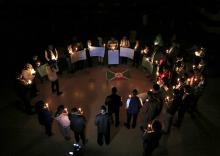
A serious breakdown between the powerful Roman Catholic Church and the government in Burundi is raising concerns over stability in the East African nation, as senior government officials accuse the church of sponsoring violence. Since April 2015, the country has been racked by chaos after President Pierre Nkurunziza agreed to run for a third term. Catholic bishops had strongly opposed the move, saying the constitution was clear that a president should serve only two terms.
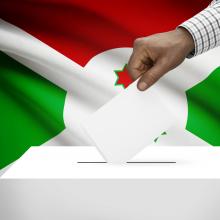
“There is nowhere a human being should be allowed to enslave others.”
This is a statement made by Burundian Catholic Archbishop Simon Ntamwana, referring to the Burundian president who was seeking an extra term in power. The archbishop was implicitly calling the president's actions unjust and unacceptable.
Indeed, the term limit crisis in Africa needs to be considered in the same light as the liberation, decolonization, and democratization movements against slavery and apartheid. Similarly to those struggles in history, today's term limit crisis in Africa is characterized by people struggling against oppression and political injustice.

THE MOST CRITICAL priority for the international community regarding Syria—in addition to addressing the immediate humanitarian needs—is to implement a cease-fire in as much of the country as possible. An arms moratorium on both the regime and rebel groups must be implemented and strictly enforced. And negotiations for a more democratic and representative government should move forward, even if it initially includes important foreign and domestic elements who do not share those values.
Especially in response to Russian military actions in Syria, President Obama is being pressured by both Republicans and Democratic hawks to militarize the situation further by sending more arms to rebel groups and increasing direct U.S. military involvement. As problematic as such military responses may be, the diplomatic alternatives aren’t much better.
Some of the most powerful opposition forces—the so-called Islamic State (ISIS) and other hardline Islamists in the al- Nusra Front—appear to have little interest in negotiations. And the prospect of working out an arrangement that would keep in power Assad’s brutal regime, which has been responsible for the vast majority of the more than 100,000 civilian deaths in the nearly five-year conflict, is extremely hard to accept.
Unfortunately, unlike most dictatorships that have been overthrown by armed or unarmed struggle in recent decades, the power in Damascus does not rest in the hands of a single dictator. Assad heads a longstanding ruling apparatus led by the Baath Party and the military that, despite its corruption and brutality, still has a social base. A fairly large minority of Syrians—consisting of Alawites, Christians and other minority communities; Baath Party loyalists and government employees; the professional armed forces and security services; and the largely Sunni crony capitalist class that the regime has nurtured—still cling to Assad’s government.
They constitute a large enough segment of Syrian society so that no anti-regime struggle can win without cascading defections, which is unlikely when the alternative is perceived to be rule by totalitarian Salafists such as ISIS.
During the first six months of the uprising in 2011, when the anti-regime movement was largely nonviolent, pro-democratic, and more diverse in terms of support, it appeared the regime could be eventually toppled. Now, in the context of armed struggle and the rise of Islamist extremists, many who once were working to topple the regime see it as the lesser evil.

To be black in America is to listen to death daily. To hear mothers wailing at unnecessary funerals, to see fathers mourning lost sons, to offer graveside prayers that puncture the heart of God — this is the sorrow song of a people, and a nation, haunted by racism.
Over our heads however, I hear the sweet, dark sounds of freedom in the air, calling for the dry bones of democracy to arise from the segregated sinews of our society. The multiracial chorus of protestors chanting, "I can't breathe," the die-ins, the walk-outs, and the highway-halting actions of youth from New York to Chicago to Tallahassee to Los Angeles represent a thirst and hunger for righteousness that includes and yet transcends voting.
To join within this symphony of justice, I am calling faith communities to participate in a national #DialInForJustice during the month of December. The goal is to call the Unites States Department of Justice and local police departments, communicating our desire to see systemic reforms to policing in America. This initiative seeks to lift up faith-filled voices alongside the already existing trumpet blasts of groups like the Organization of Black Struggle, Dream Defenders, PICO, Sojourners, and so on.

Election 2014: Something important has just happened.
Big money bought an election. Fear prevailed over confidence and loathing over reason. The majority chose not to vote, allowing a passionate minority — older, whiter — to change the balance of power. Attack ads drowned out issues. A broken political system tolerated cheating and bullying.
Most worrisome is the absence of the virtues that enable a democracy to function in a challenging world. Civic-mindedness gave way to clever voter-suppression tactics. Freedom of the press got lost in attack ads and deliberate distortions of reality. Respect for opponents is gone. So too is the search for common ground, competing ideas, confidence in the nation, confidence in government, confidence in the future. Gone, gone, gone.
How could this happen? Several reasons — from intellectual laziness to self-serving leaders. The reason that touches my world is the collapse of progressive Christianity as a teacher of civic virtues.
Progressive Christianity is only one voice on the spectrum of religious opinions. But over the years it has had a large impact in its insistence on honesty, fairness, tolerance and humility. Progressive Christians have fought slavery, racial injustice and oppression of the vulnerable. Our search for truth has allowed room for other truths, other voices — a critical attitude in preserving democracy.
ECONOMIC INEQUALITY ISN'T NEW. But this spring it became trendy, especially after Pope Francis dropped the tweet heard ’round the world in April: “Inequality is the root of social evil.”
Around the same time, Capital in the Twenty-First Century—a just-short-of-700-page book by French economist Thomas Piketty—became a best seller. Piketty, while not quite as concise as the pope, also sees wealth inequality as a problem—he focuses on its damaging effects on democratic institutions. Using extensive data, Piketty makes the case that escalating wealth inequality is built into capitalism. Without specific interventions, he writes, our politics and culture will be dominated by a small elite controlling vast amounts of primarily inherited wealth. It might create a new Gilded Age for some, but it won’t be any shinier for regular folks than the first one a century ago.
When class and economic status become news, the conversation tends to get a little shrill. Terms such as “Marxist” and “anti-business” were tossed around freely in reference to both Piketty and the pope. Some, of a more spiritual bent, sought to warn the pope and other Christians who decry inequality about the biblical sin of “covetousness,” offering reminders of the virtue of hard work. (I guess the hidden message of the parable of the rich man and the beggar at his gate is that Lazarus is envious; the real issue must be Lazarus’ poor work ethic and lack of get-up-and-go!)
But the inequality gap should be of concern to everyone, whatever their income or ideology. The point is not the fact that there are differences in wealth—those exist in any human society. And it’s not necessarily helpful or productive to seek scapegoats or assign broad characteristics to particular classes; neither poor people in general nor rich people in general are inherently noble, lazy, or scheming—temptations may vary, but good and evil can be found in people of every economic status.

The New York Knicks have a dilemma: Hold on to high-scoring star Carmelo Anthony, the consummate me-first ball hog, or build their future on team players.
I am hoping new coach Phil Jackson gives Anthony his walking papers. The Knicks have been a poor basketball team with Melo’s I-am-the-man selfishness. They will be better with players who know how to work as a unit.
As the coaching cliche puts it, “There is no ‘I’ in ‘team.’” There is, however, an “I” in “big bucks,” and in “I am the star,” and in “watch my magic.”
It’s the very “I” with which Satan tested Jesus in the wilderness. It’s the “I” that builds empires on the suffering of many and destroys them just as quickly. It’s the “I” that cripples families and ruins enterprises.

I’ve recently been thinking a lot about failure.
Not my failures, though I suspect we could come up with a few.
No, I’ve thinking about Scott Walker’s failed governorship in Wisconsin.
And Barack Obama’s failed presidency in the nation.
And our failed foreign policy.
And the failed Affordable Care Act.
And Walker’s failed jobs policy for the Badger State. And so on.
Then I started thinking about the failure of our political dialogue these days.